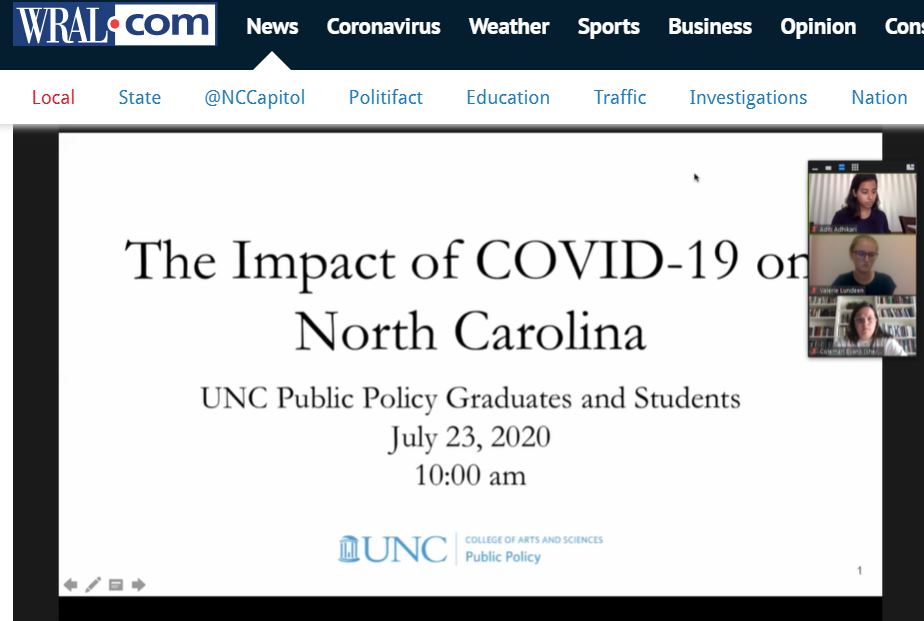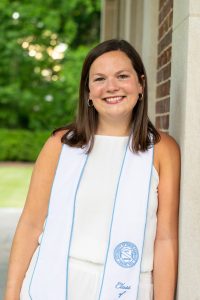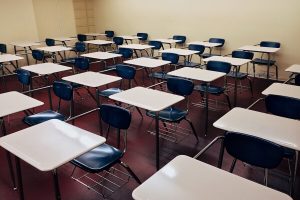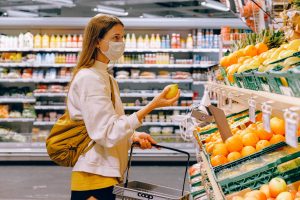UNC public policy fellows spent the summer analyzing the impact of the pandemic to the state, including effects on health, economics, poverty and education. In a project that fits squarely with Carolina’s public service mission, they hope their findings will inform policymakers’ decisions as North Carolina continues to deal with COVID-19.

This fall Coleman Evans ’20 will begin her career in education, teaching fifth grade social studies through Teach for America at a public school in Washington, D.C. (She’ll be teaching virtually through at least early November.)

Education and education policy matter a lot to her. That fact hit home as the North Carolina native led a team of fellow public policy researchers studying the impact of COVID-19 on the state’s classrooms. The summer fellows — recent public policy graduates and current students — were mentored by faculty, Ph.D. students and outside practitioners in completing their task as they examined what they call the “exogenous shock” of the pandemic on health, economics, poverty and education.
To put it simply in terms of the impact on K-12 education: The researchers say students do not have the support they need when they go back to school.
“North Carolina schools fail to meet the nationally recommended ratios for student-to-nurse, student-to-guidance counselor and student-to-school psychologist ratios,” Evans said. “Even more, the countywide school districts that are experiencing the greatest concentration of COVID-19 cases are the least prepared to support student health needs.”
Even as classes move online, Evans said she hopes state and district leaders will continue to think about how to creatively meet students’ unique physical and mental health needs in a remote learning environment.
Other key data findings include:
- The number of people unemployed in May 2020 exceeded the number of people unemployed at the height of the Great Recession (2007-2009) in North Carolina.
- Probability of death once infected with COVID-19 is higher in counties with greater concentrations of animal farms or meat-processing facilities.
- Counties with a higher concentration of poverty have more deadly cases of COVID-19.
- On many fronts, the pandemic has hit Black and Latino households the hardest. As one example, more Black than white households used government stimulus checks for expenses. Over a third of Latino households never received a payment.
- Overall, the pandemic has increased North Carolinians’ anxiety. Feelings of anxiety, nervousness and stress have been reported at higher levels in minority communities.

“These recent graduates and current students went above and beyond. They went out and used their analytical skills and generated data that tells a very powerful North Carolina story,” said Daniel Gitterman, Duncan MacRae ’09 and Rebecca Kyle MacRae Professor and chair of the department of public policy. “And I think one of the key things we also try to teach them is communicating that to a broader audience.”
“We hope that by making this data publicly available that it will help target communities in need.”
Fellows received guidance from UNC Media Relations on honing their message into a strong narrative that would translate to a lay audience. They held a virtual news conference to share their findings, resulting in media coverage by WRAL, WUNC, CBS-17 and other news outlets.
They also shared their research with state education policy professionals and philanthropic organizations.
Surprising findings

Valerie Lundeen ’20, chair of the economy team, said it was sobering to learn that the number of people unemployed in May 2020 exceeded the number of people unemployed at the height of the Great Recession in North Carolina.
“I was in fifth grade during the Great Recession and now I’m graduating into this current economic situation,” she said. “This terrible crisis that put people out of work when we were kids pales in comparison to what’s happening now. Every number represents a real person whose life was upended by losing a job.”
Fortunately Lundeen has a job; she’ll be joining Hamilton Place Strategies in D.C. as an analyst, assisting clients in analyzing economic policy and developing data-driven communication strategies.
Aditi Adhikari ’20 led the health team and thinks one of the most important findings from that sector is the sharp increase in Medicaid enrollment. That’s something she hopes prompts state-level conversations about sustainable ways to keep all North Carolinians healthy.
“Those findings demonstrate a lot of people are losing health care coverage, likely because they are losing their jobs and are having to rely on the state for coverage,” said Adhikari, who will join a management consulting firm in Atlanta later this year. “It troubles me that people are losing health coverage in the midst of a global pandemic.”

Sarah Mackenzie ’20 spearheaded the poverty team’s work. She said the data clarified the team’s initial concern that the pandemic is impacting the state’s most vulnerable populations the hardest.
“It’s disproportionately affecting low-income people and people of color,” said Mackenzie. “Black and Latino residents were most likely to report an inability to pay their rent the next month or to report food insecurity issues, and people who were reporting more food insecurity also reported higher rates of anxiety.”
Mackenzie just moved to New York to begin work at a legal nonprofit, the Center for Appellate Litigation.
Teamwork and state impact
With social distancing in place, teams had to coordinate dozens of schedules, sometimes across time zones, as they used remote-learning and collaborative technologies like Zoom and Google Docs to work together. Fellows said they put extra time and energy into the project because of its urgency.

Mackenzie hopes the project will benefit the place where she’s spent the last four years.
“I was drawn to Carolina and spent most of my time there doing service and social justice work, and this was a natural extension of that,” she said. “It allowed me to apply my rich academic experience in a way that aligned with the causes I really care about. We balanced economics and statistics with politics, ethics and sociology and wove all those factors together.”
Evans calls her team members “exceptionally brilliant” and said she learned as much from working with them as she did from the research itself. She also praised the mentorship provided by others and felt like she was able to contribute to her home state in a meaningful way.
“Dr. Gitterman is an unwavering advocate for undergraduate students,” she said. “He continually creates opportunities for them to engage in meaningful research.”
Lundeen hopes the data reaches the ears of state leaders, as North Carolina is still in the throes of dealing with COVID-19.
“We urge state leaders to implement crisis-level responses to crisis-level problems,” Lundeen said. “We’re seeing astronomical impacts of this pandemic across all sectors — the labor market, housing and food security, mental and physical health and more. Right here in Orange County, we’ve had an affordable housing crisis for years, and it’s scary to think about our neighbors and housing insecurity.”
Importance of private funding

Private funding made the summer fellowships possible, including support from the Hodding Carter III Public Service Fund, Hammer Ph.D. Fund, John Hardin Undergraduate Excellence Fund, Thomas W. Ross Leadership Fund and Nancy Stegman Ph.D. Fund.
“Private support can prove essential in giving students these valuable applied research and internship experiences,” Gitterman said.
Adhikari said because her job’s start date got pushed to December, she especially appreciated the summer fellowship.
“This project certainly helped bridge both the financial gap and professional development gap by creating an environment where I could improve my research, data analysis, communication and management skills,” she said.
“In the end, we hope the findings can be used to draw attention to those that are most vulnerable.”
By Kim Spurr, College of Arts & Sciences
